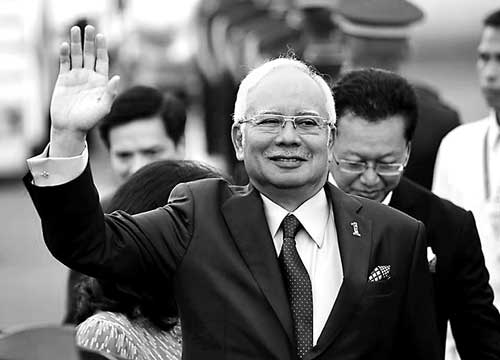Sunday Feb 22, 2026
Sunday Feb 22, 2026
Saturday, 29 April 2017 00:00 - - {{hitsCtrl.values.hits}}
Reuters: Malaysian Prime Minister Najib Razak on Friday warned that Southeast Asian countries needed to ensure their economic growth was inclusive, or risk marginalised populations turning to violent extremism or even overturning political systems.
Speaking at an event for entrepreneurs during the Association of South East Asian Nations (ASEAN) summit in Manila, Najib said the region was posting strong growth that could see ASEAN become the world’s fourth-largest economy, but that growth needed to be equitable.
“We do not want our citizens to be marginalised in the age of extremism and radicalisation,” he said.
“We know that those who see no hope in their own societies are more prone to the siren calls of terrorists who can and exploit their vulnerability and fill them with their lies.”
Islamist extremism is expected to be high on the agenda during this week’s meetings, with fears for Indonesia, Malaysia and the Philippines about piracy and the rising threat of Islamic State.
Of particular concern is the ease in which militants can acquire weapons, seek refuge with existing rebel groups and move between the many islands between the three countries.
Najib lauded the success of ASEAN, which is celebrating its 50th anniversary this year, in expanding its collective GDP to about $2.7 trillion now, from $87 billion four decades ago.
ASEAN has 10 members: Thailand, Myanmar, Laos, Cambodia, Vietnam, Singapore, Brunei, Malaysia, Indonesia and the Philippines.
He warned that economic disparity was dangerous at a political level too, fuelling anger and populism that was causing problem in Western Europe.
“The neglected underclass of those who felt left behind by economic growth, prosperity and globalisation can overturn elections and political systems,” he said.
Economists frequently point out huge income gaps among the 620 million people of Southeast Asia, a region that has one of the world’s largest concentrations of billionaires, according to Forbes Magazine.
Najib said awareness of ASEAN needed to be better promoted among its citizens to “make it feel real, relevant and tangible”. Trade integration was lagging, he said, with too many trade tariffs still in existence.
Their removal, and harmonised customs standards, needed to be “vigorously pursued”, he said.
Philippines Vice President Leni Robredo echoed Najib’s call for leaders to pay more attention to their poor.
“For many years, many thought income inequality was alright. But the voiceless and the powerless are now raring to be heard, and with technology and social media, their frustrations are being felt on a global scale,” she said in a speech.
“They are rejecting globalisation, democracy, traditional media.”